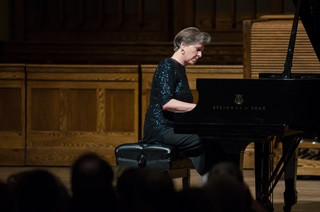|
Back
Magisterial Authority Ottawa
Dominion-Chalmers United Church
08/01/2014 -
Edvard Grieg: “Canon”, Lyric Pieces, Op. 38, No. 8 – “Albumleaf”, Lyric Pieces Op. 47, No. 2 – “Gade”, Lyric Pieces Op. 57, No. 2 – “Salon”, Lyric Pieces Op. 65, No. 4 – “Summer’s Eve”, Lyric Pieces Op. 71, No. 2 – “Puck”, Lyric Pieces Op. 71, No. 3 – “Wedding Day at Troldhaugen”, Lyric Pieces Op. 65, No. 6
Franz Schubert: Sonata No. 7 in E flat Major, Op. 122, D. 568
Frédéric Chopin: Polonaise-Fantaisie in A flat Major, Op. 61 – Nocturne in B Major, Op. 9, No. 3 – Impromptu No. 3 in G flat Major, Op. 51 – Mazurka in D Major, Op. 33, No. 2 – Ballade No. 4 in F Minor, Op. 52
Janina Fialkowska (piano)

J. Fialkowska (© Michael Gauthier)
Canadian pianist Janina Fialkowska’s radiant solo recital for Ottawa’s continuing ChamberFest was ‘gala’ in the absolute best sense of that word. Fialkowska is a mature artist at the height of technical and artistic powers who plays according to, and trusting her instincts. There is no sign of her years on the competition circuit decades ago or the pressured, aggressive performance we continue to hear from younger musicians on this treadmill.
Competitions made Fialkowska a protégé of the legendary Arthur Rubinstein and her affinity for the 19th century repertoire of Grieg, Schubert and Chopin, which she performed in Ottawa, is indeed parallel to that of Rubinstein. Her particular approach to Chopin, interestingly, may be closer to that of Rubinstein’s great rival, the equally legendary Vladimir Horowitz. This came across vividly in not one but two of Chopin’s most demanding large-scale compositions, the Polonaise-Fantaisie, the composer’s final major solo work, and the Ballade No. 4, again from his later output. If the apocalyptic Polonaise-Fantaisie anticipates Wagner, Strauss and even Mahler, the Ballade, with its unprecedented, even contrapuntal melding of rondo, variation and sonata form structures, alludes to late Beethoven.
Fialkowska played the works with a magisterial authority that, among other accomplishments, respected their architecture as much as more obvious lyrical and textural riches, which also are fabulous. While not the most technically taxing of Chopin’s larger works, the Polonaise-Fantaisie is one of his most difficult to unify --- it’s known that Chopin himself was challenged completing it during the summer of 1846 and that contemporaries, including Franz Liszt, found the work perplexing. The declamatory opening flourish immediately followed by celestial, ascending figuration establishes a pattern of ingenious contrasts on multiple levels from the work’s outset. Chopin continues with two major themes, the second being a central interlude; then, after a minute or so of seemingly improvised drifting, he nudges, then propels us back to reality with hairpin bend economy, ushering in climactic pages which unite the work’s primary elements with joyous bravura and awesome intellect.
Fialkowska understands all of this and she tossed off the work with such commanding alacrity, some listeners may not have recognized just what a feat she’d accomplished. She brought similar lavish clarity to the Ballade, though in this performance her tempi seemed a bit rushed. Nonetheless, Fialkowska never for a split second lost focus and, again, there were extraordinary details which illuminated and relished the work’s genius, such as the exquisite miniature canon which Chopin uses to return the work to its earlier components for an elaborate, dramatic conclusion.
In a selection of shorter works by Chopin, including the familiar ‘Minute’ Waltz for a charming encore, Fialkowska consistently respected structure as much as sentiment, unifying her approach with rich sound and a masterly command of dynamic and tonal range. She brought these qualities with generosity also to the selection of Grieg’s Lyric Pieces which opened the program, as well as the Schubert Sonata No. 7 which rounded out the first half. The Sonata is rarely heard these days, and may not have been performed in Ottawa since Anton Kuerti’s marathon Schubert cycle thirty years ago.
But it was in the Chopin, especially the two larger works, that Fialkowska unequivocally demonstrated what a superb musician and pianist she has become.
Charles Pope Jr.
|